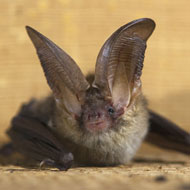
A groundbreaking project to help churches that host large bat roosts has received £3.8 million funding from the Heritage Lottery Fund.
Led by Natural England, the Bats in Churches project will deliver a five-year partnership between wildlife, heritage conservation and church organisations to help save bats and protect churches.
Bat species in the UK have suffered significant historical declines and loss of habitat has forced some species to take refuge in buildings such as historic churches.
While many church communities live harmoniously with bat roosts, in some cases bats are causing irreparable damage to historically significant monuments and memorials, as well as impacting on people who use the buildings.
The Bats in Churches project will:
- find practical solutions to enable 102 of the most severely impacted church communities to reduce the impact of bats on the church, without harming them
- create a new network of fully trained volunteers who can undertake bat surveys and support congregations who have bat roosts at their church
- train professional ecologists and historic building specialists in new techniques and build knowledge to improve their advice to congregations
- collect and collate up-to-date data from over 700 churches across England, helping to build a specialist knowledge base of bats and their use of churches
- strengthen local communities so people value and engage with their local natural and historic built heritage.
Natural England chairman, Andrew Sells, said: “The funding announced today will give great impetus to the partnership of heritage, wildlife and church organisations which aims to resolve conflicts.
"Together these groups are demonstrating astonishing passion and drive in working together to save these wonderful animals and protect cherished churches across the country.”



 RCVS Knowledge has welcomed Professor Peter Cockcroft as editor-in-chief for Veterinary Evidence.
RCVS Knowledge has welcomed Professor Peter Cockcroft as editor-in-chief for Veterinary Evidence.